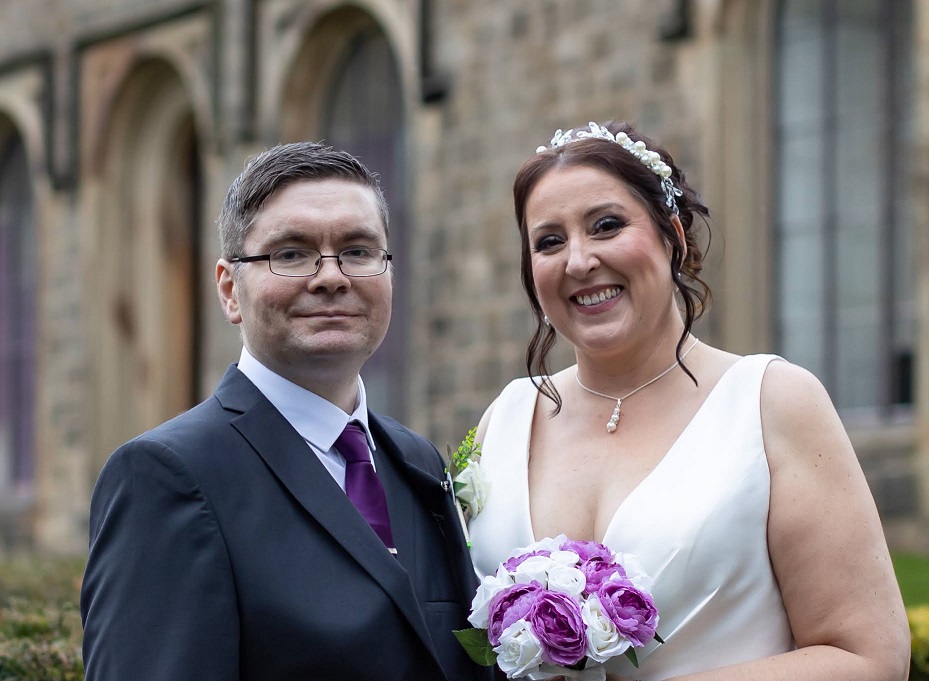Hi, I’m Claire Brockbank, Head of HR at CUBE HR and I’m married to Chris. In the summer of 2019, at the age of 36, Chris was diagnosed with Young Onset Parkinson’s.
What is Parkinson’s?
Parkinson’s is the fastest growing neurological condition in the world and there is currently no cure.
There are approximately 145,000 people in the UK living with a Parkinson’s diagnosis – only 1.2% of them are under the age of 50 and therefore have a diagnosis of Young Onset Parkinson’s.
People with Parkinson’s are all affected differently and there are up to 40 different symptoms someone might experience. For those with Young Onset Parkinson’s, symptoms may be less frequent and may progress more slowly, but they do often experience more side effects from medications and are at greater risk of developing involuntary movements, cramping and abnormal postures.
On World Parkinson’s Awareness Day, we thought we’d share Chris’ story.
How did you first get diagnosed?
I started to notice some weakness in my left arm – I couldn’t lift it above shoulder height, and I was struggling to effectively do my job. I’m also left-handed so this made the weakness more significant.
I went to visit my GP who did some strength tests on me. She asked me if I’d ever experienced tremors in my hand or arm and I said no – on the way to the bus stop after the appointment my arm started with tremors for the first time.
My GP referred me to a neurologist, who did extensive tests on me and he asked me if I had any thoughts as to what could be wrong. I thought it could either be tremor (a milder version of Parkinson’s) or Parkinson’s itself and he confirmed that it was indeed Young Onset Parkinson’s.
How did you feel when you got your diagnosis?
To be honest, I was glad I’d got an answer as to what was wrong and I could start getting some treatment but having not long since recovered from another debilitating illness (Ulcerative Colitis), I was pretty angry that my life was going to be disrupted once again.
Were you aware at that time of how much impact it might have on your life going forward?
Yes and np. I was already finding it difficult to work. I was supporting a family at the time, but I realised I’d probably have to do part time hours. The specialist told me that everyone progressed at a different rate in how their condition deteriorated, so there’s still a lot of uncertainty as to how my quality of life will be.
How does having Parkinson’s impact you on a day-to-day basis?
I have limited strength and movement in my left arm (and as I said, I’m left-handed so it’s even more challenging!) so I find it difficult to get dressed or do anything that requires a full range of movement.
The tremor in my hand and arm means that I often spill things and find it hard to do day to day stuff like preparing meals.
Parkinson’s also affects my cognition and speech so I struggle sometimes to get my words out, or to find the word I’m searching for.
My body temperature doesn’t regulate itself well so I’m often too hot. In the heatwaves during last summer it was quite unbearable and holidays to exotic hot places are definitely my worst nightmare.
Probably the most impactful thing is the muscle fatigue and stiffness. I have to be very careful how much physical exercise I do as I tire very easily – I’m often falling asleep by about 8.30pm!
Are you aware of when your tremor is going to happen?
No, there’s no advance notice really, I just suddenly start with a tremor. It can be just my thumb, my hand or my whole arm at times.
Sometimes movement or sensation can ease it and I’ve found concentrating on something usually helps too, but occasionally the muscle cramps so badly that nothing resolves it other than my medication.
Stress can be a really big trigger for me with the tremor, as can tiredness and being out in the cold (if it’s really cold).
What sort of medications do you take and how do they impact you?
I take two sets of medication, one to deal with the tremor and one to override the muscle stiffness and fatigue (which also helps with the tremor). I have to take these 4 times a day at set times. Luckily the medication doesn’t have too many side effects, other than occasional bouts of nausea and forgetfulness.
Did you tell your employer about your diagnosis?
Yes, almost straight away. I was a support worker. My employer carried out a health review with me and asked me what support they could offer – I didn’t really know at the time as it was all very new and it took a while for my medication to be at the correct dosage, I just asked for understanding if I wasn’t able to attend work one day (until the medication settled I was struggling with the fatigue). They did say they’d review with me every month, but unfortunately this didn’t happen and then COVID came along. I was considered extremely vulnerable and asked to be furloughed, but was told this wasn’t an option. That was a really stressful time for me as I ended up without a job.
As I used to do upholstery as a profession, before I became a support worker, I now do self-employed upholstery projects – I wasn’t sure if I would be able to manage this physically, but because I work for myself, I can take time to rest when needed and I have learned not to take on projects that are too large.
What advice would you give to an employer who has an employee in your situation?
I’d say talk to the employee about what they need. They might need to reduce hours or adjust start or finish times. It’s likely they’ll have a bit more time off (at least at first) so be kind with your absence triggers and be aware they may need more time off for appointments. It does depend greatly on their job role too – if the role is more physical there may be more adjustments needed. I’d also definitely say get some medical advice – as a newly diagnosed employee I had no idea what to expect when I spoke to my employer, so it was hard for me to tell them what I needed, a medical or occupational health report would probably have helped a lot.
To find more information, support and resources about Parkinson’s visit Homepage | Parkinson’s UK (parkinsons.org.uk)




